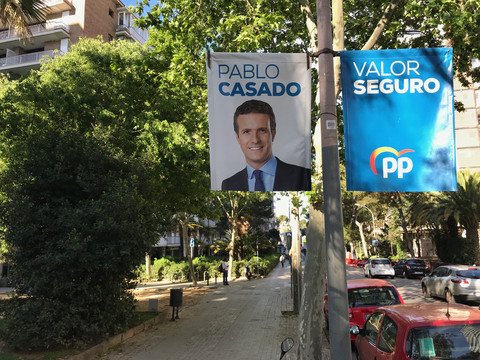Spain undecided and divided ahead of Sunday's election.
BARCELONA, TODAY, 10:54
Spain will head for the ballot boxes this Sunday (28 April) to elect a new government, in an election that is seen as the country's most fragmented and unclear vote.
Fragmented, because Spain's traditional two-party system has given way to a political spectrum with now five parties fighting over voters. And unclear, because around 40 percent of voters are still undecided on who to vote for.
Plus, it is the third general election in just four years in Spain - the fourth biggest economy in the Eurozone.
According to the polls, the social democrats (PSOE) led by the current prime minister Pedro Sanchez, is expected to win around 30 percent of the vote, and increase its seat count, but without enough votes for an outright majority.
Sanchez came to power ten months ago after a multi-party motion of no-confidence took down Mariano Rajoy's conservative Partido Popular (PP) government, over corruption in his party.
The PP and its new leader Pablo Casado, on the other hand, are expected to lose several seats, getting around 20 percent of the votes, compared to 33 percent in the last election. Some of the party's hardline conservative supporters are opting for far-right party Vox, expected to get around 11 percent of the vote.
Spain is therefore set to join the list of European countries with a far-right party gaining more that one seat in the legislative arena, for the first time since the country's peaceful transition into a democracy from a fascist dictatorship in the late 1970s.
Centre-right Ciudadanos and the leftist Podemos tie, on around 14 percent of the votes, according to the polls, and slightly lower than the last election in 2016.
Vote first, negotiate after
But without a majority for any parties, the hard work seems to come after the election, when whoever wins the most votes, must start negotiations to find support for a government.
If it does fall on Sanchez, he would need to govern in a minority, or form a coalition, which is still uncharted territory for a Spanish national government.
If he would go for a leftist alliance he would need support from Unidos Podemos led by Pablo Iglesias, and probably also from the nationalist parties in the Basque and Catalan regions.
It was in fact the lack of support from the Catalan nationalist parties for the 2019 budget that led to the early calls for elections back in February.
Sanchez could also go for a more left-centre government with the Ciudadanos, but its leader Albert Rivera has already stated that his party will not form a coalition with the socialists.
Alternatively, the three parties on the right of the centre, PP, Ciudadanos and Vox, could get together, mirroring the recent regional election outcome in Andalucia, where PP and Ciudadanos formed a government with the support of Vox, and ending four decades of socialist rule.
In 2015, the political parties were unable to agree on forming a government, leading to fresh elections in 2016.
"It is a very open scenario," says Xavier Casals, a historian at the Blanquerna University in Barcelona. "Especially with the whole political spectre in fragmentation, and with the high level of voters who might only decide on who to vote for on the very day of the election."
"The only prediction in this election, is that no predictions can be made," he tells EUobserver.



